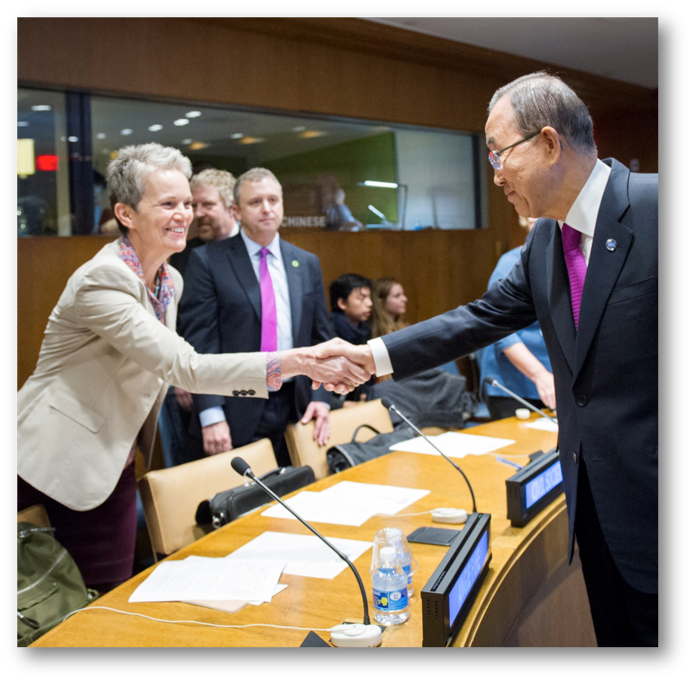
ICLEI director Angie Fyfe (left) meeting with former UN Secretary General Ban Ki Moon. Photo by UN/Rick Bajornas.
Cities and towns are where the rubber hits the road when it comes to climate adaptation. It’s at the community level where key decisions are made about where to build, how to prepare for disaster and what modes of transit to support, for example. Local government is also a first line of contact for concerned citizens to shape these decisions by showing up at meetings, volunteering for a committee or running for local office.
By supporting local climate initiatives, the ICLEI – Local Governments for Sustainability is helping the world get ready for change.
“Cities and local governments will steer the development of the 21st century; therefore, local governments play the critical role of making that development sustainable—or not,” explains Angie Fyfe, ICLEI’s Executive Director. “As the body of government closest to the people, local government is the most accessible way to affect advocacy, policy making and implementation.”
One way ICLEI supports local governments is by matching them with expert scientists through a partnership with TEX. “ICLEI connected with TEX because the program allows communities to understand the potential conditions that we need to plan for,” says Fyfe.
Local leaders often don’t have the level of climate expertise to plan for realistic climate change scenarios. Scientists, on the other hand, often don’t realize the difficulties faced by mayors, city planners, or emergency departments in balancing competing interests. Both sides often come away from these collaborations with a new perspective.
“Policy-making is a messy business,” Fyfe notes. “Don’t be discouraged by the fact that your research will sometimes be rejected, your recommendations unheralded…this is part of the process. The most important thing a scientist can do is to accept the many competing interests staff and local elected officials must balance in their work. When local officials see you as a collaborator sensitive to the realities of their environment, they will appreciate your contributions all the more.”
The partnership between TEX and ICLEI has yielded some exceptional programs in cities big and small across the United States:
- After government officials in Eugene, Ore. set ambitious greenhouse gas reduction targets in 2015, ICLEI and TEX facilitated a partnership with a greenhouse gas expert that resulted in a published action plan to help the city find realistic measures to achieve those goals.
- Officials in Granite City, Ill., a small town with a long history of air pollution, collaborated with an engineering professor and adopted a plan to make air quality monitoring efforts visible, accessible and engaging to residents.
- Oakland, Calif. leaders were paired with ground and storm water experts to improve the city’s storm water management system, which has come under increasing pressure due to rising sea levels.
- ICLEI and TEX identified two climate scientists to help officials in Washington, DC develop strategies to mitigate the effects of extreme heat and other forms of severe weather.
- ICLEI also partnered with TEX to identify 15 promising communities to participate in the Resilience Dialogues project, a collaboration between scientists and community leaders to engage community members, identify climate resilience priorities and ultimately create climate-resistant communities.
